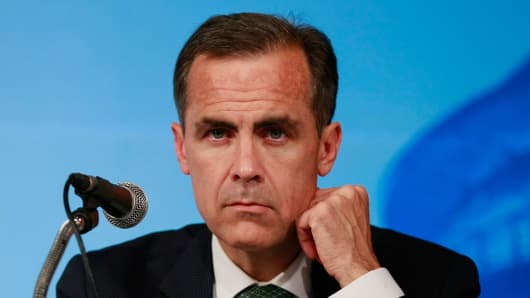Incoming Bank of England Governor Mark Carney is set to address policymakers at a U.K. parliamentary committee on Thursday with many expecting sterling to fall as he delivers his dovish policy outlook, but analysts have told CNBC that this could prove to be wrong and the currency could in fact move sharply higher.
Carney, currently the governor of the Bank of Canada, is due to take up his new post on July 1, 2013. He's expected to lay out plans for future central bank policy at Thursday's appearance.
He has previously hinted at the direction he intends to take. This includes his stance that central banks aren't "maxed out", targeting growth with monetary stimulus, ignoring inflation and generally getting aggressive with policy action.
(Read More: QE Program a 'Disaster,' Say UK Saving and Pension Groups)
The question is, will he deliver a picture of dovish tactics that will send sterling lower? Or will he be cautious, underwhelming investors and causing the pound to move sharply higher?
"A lot of people have put on short sterling trades already. So the expectations for Carney to come out all in favor of nominal GDP (gross domestic product) targeting, something as aggressive if not more aggressive. If he disappoints that in anyway whatsoever, as in being less aggressive, or a bit more cautious on policy innovation then sterling could correct higher," Geoffrey Yu, forex strategist at UBS, told CNBC Wednesday.
"A lot of money has been put into this trade a bit too quickly so in the short term I wouldn't add to short sterling positions beyond where we are right now."
Analysts at Citi agree, underlining that if Carney adds little new on top of what has already been discussed, this could be seen as underwhelming.
"While sterling could rally in the absence of dovish surprises during the Q&A, the bounce need not be sustained if investors remain concerned about the U.K. economic outlook," it said in a research note.
"If Carney presents bold plans for activist policies involving further aggressive easing, the initial sterling selloff could give way to more resilience if investors view the change in guard at the helm of the BoE as a precursor for more effective mix of monetary policies."
Sterling has already taken a bashing in recent weeks. The pound has crumbled to its lowest in 15 months against the euro, and a five-month low versus the dollar. The currency has even seen a sell-off during Carney's previous public appearances.
"Sterling has slipped lower during Carney's previous speeches as the market has reacted to his inherent 'dovishness'. There is little to suggest a similar thing will not happen on Thursday morning. In fact, I believe the reason for sterling's weakness [on Tuesday] was positioning before the fact." Jeremy Cook, chief economist at currency broker World First told CNBC.com
(Read More: Banks Healthier but Risks Remain: Mark Carney)
The research team at Lloyds says that the pound is struggling in a more "risk positive" environment with investors opting for the euro as the sovereign crisis begins to ease.
"EUR/GBP should see initial resistance around the recent high of 0.8717; for GBP/USD the 1.5600/30 area could provide some initial support, beyond that the next major support is around 1.5530," Lloyds said in a research note.
Eimear Daly, head of market analysis, is bullish on sterling for Thursday although she believes Carney's speech will be dovish overall.
(Read More: Watch What Central Bankers Say, Not What They Do)
"In his controversial speech in early December, Carney suggested more radical forms of central bank policy such as inflation targeting and forward guidance," she told CNBC.com
"Carney was talking in generalities and in fact never confined his views to the Bank of England. Investors will now be questioning their assumption that these particular comments related to future Bank of England policy."
Mark Carney is due to appear before the U.K.'s Treasury Select Committee on 7 February at 9.45 am London time.
—By CNBC.com's Matt Clinch



